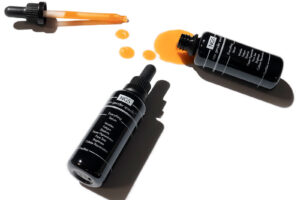“If I have to choose between my life and my hair, I’m choosing my life.” That’s what Shirley Billigmeier told her longtime friend Nancy Marshall after receiving a breast cancer diagnosis.
Both Billigmeier and Marshall received breast cancer diagnoses. However, Marshall’s diagnosis was noninvasive while Billigmeier’s required a lumpectomy, radiation, and chemotherapy. While Billigmeier ultimately accepted the potential loss of her hair as a side effect to chemotherapy, another old friend convinced Billigmeier there might be another option. Billigmeier’s childhood friend, a physician, recommended cold cap therapy after witnessing its success with one of her patients.
After some research and her physician’s approval, Billigmeier began treatment. “They all thought we were nuts because if this were anything, they would know about it and the doctors would know about it,” Marshall says. Three months after she began chemotherapy, Billigmeier still had a full head of hair.
“When Shirley walked in with hair down her back, there were tears,” Marshall says. “It was a goosebump moment.”
The two spent the rest of fall 2009 creating The Rapunzel Project, a nonprofit that officially launched the day after Billigmeier’s last treatment. The Rapunzel Project provides awareness of cold cap therapy in the United States and donates freezer cooling systems to hospitals and clinics across the country. The Rapunzel Project believes patients can’t make an informed choice if they don’t know there is a choice at all. “That was our premise,” Marshall says. “Patients deserve to have this information so that they can choose what’s right for them.”
So, what is cold cap therapy? Cold cap or scalp cooling therapy systems use close-fitting hats filled with a coolant gel frozen to between minus 15 and minus 40 degrees Fahrenheit. The systems narrow the blood vessels beneath the scalp and slow cell division, drastically reducing the amount of chemotherapy medicine which reaches the hair follicles, making the hair less likely to fall out. Patients who use cold cap or scalp cooling systems must wear the caps for up to 50 minutes before, during, and after each chemotherapy session, with the amount of time increasing based on the type of chemotherapy.
For many patients, [cold cap therapy] helps them maintain their sense of agency and privacy.
Since The Rapunzel Project’s launch in 2009, two types of cooling systems have dominated the market: manual and freezer caps. The Food and Drug Administration has approved two machine freezer capping systems: the DigniCap, first approved in December 2015, and the Paxman Scalp Cooling system, which was first approved in April 2017. Both systems are attached to refrigeration machines that circulate the coolant gel. Although hospitals and oncology centers across the country are beginning to outfit their facilities with machine freezer cap systems, the majority of cold cap therapy users employ manual cold cap systems. Manual caps stay in freezers before being worn, and users must replace the cap every 30 minutes. The most popular brands include Penguin Cold Caps, Chemo Cold Caps, and Arctic Cold Caps, among others.
Despite its growing popularity, there are still obstacles some patients must face to receive cold cap therapy. Manual caps have still not been approved by the FDA, creating a problem from a liability standpoint. As well, some doctors are concerned the caps may prevent chemotherapy from reaching cancer cells in the scalp, despite a 2017 study which found scalp cooling does not significantly increase the risk of scalp-skin metastases.
According to Marshall, clinics may also worry about the cooling systems taking up space in their facilities or patients occupying chemotherapy chairs for too long. There’s also the issue of cost and accessibility. “It’s hard for us as outsiders to know why we don’t have a single freezer in Nebraska, [but] we have probably 50 in California,” Marshall says, adding,“Some people either don’t care [about cold cap therapy], or may care, but can’t tolerate the treatment as it currently stands, or who can’t afford the treatment.”
But the physical side effects of chemotherapy often make a cancer diagnosis public.
Cold caps and freezer cap systems are considered “highly effective” in about 50 to 65 percent of the patients who use them. However, patients who received taxane chemotherapy found better results with the systems than those who received anthracycline chemotherapy. However, cold cap therapy does more than help men and women retain their hair. For many patients, it helps them maintain their sense of agency and privacy. “Once patients have dealt with their diagnosis and their treatment and their mortality fears and everything else, when you get right down to it, the next fear and an overwhelming fear for many patients is they’re going to lose their hair,” Marshall says. “And this is taking the bull by the horns and saying, ‘We can help you.’”
According to Marshall, many patients are concerned with their sense of identity. Very few cancer patients want pity, but the physical side effects of chemotherapy often make a cancer diagnosis public. “If I have heart disease, the only people who know about it are the people I tell,” says Marshall. “But when you walk down the street with a bald head or a bandana, it’s everybody’s business.” Cold cap therapy can offer relief from public scrutiny. “I can tell you from my cancer journey [that] well-wishers are exhausting. You don’t always have the emotional resources to deal with people who want to chat about it or wish you well or give you advice,” Marshall adds. When a patient looks in the mirror and doesn’t see a stranger, their attitude about chemotherapy also changes. Treatment is no longer a physical and mental punishment; it is a necessary step to help fight their illness.
Cold cap therapy can offer relief from public scrutiny.
Since their launch, The Rapunzel Project has directly connected with cancer patients through a partnership with Kenra, a professional hair care brand found in salons across the country. In addition to donating to the nonprofit, the brand provided information about The Rapunzel Project to their client salons during a Breast Cancer Awareness Month fundraiser in October 2017. “When you get a diagnosis, and you face purchasing a wig or shaving your head, most women go talk to their stylist,” Marshall says. “Divulging something as intimate as a medical diagnosis to a stylist isn’t that peculiar, and the stylist is in a position [to] turn around and say, ‘By the way, there’s another option. Did you know about this?”
With an increasing awareness of cold cap therapy, more FDA approvals, new insurance coverage, and more facilities across the country offering the service to patients, the future of The Rapunzel Project is in question—something Marshall and Billigmeier say they both wanted from the start. “Our actual aspiration is that we won’t need to exist anymore, and I’m very serious about that,” Marshall says. “When the day comes that [cold cap therapy] is commonplace, we’ve done our job.”







